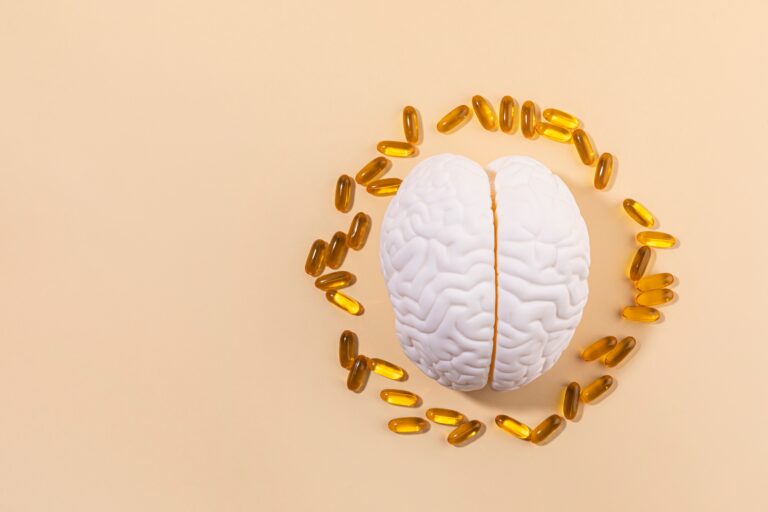DHA: A Fatty Acid for Brain Health
What is Docosahexaenoic Acid Used For? Exploring the Importance of DHA
DHA in Brain Metabolism
The brain is an extremely fatty organ, but the lipids in the brain are critical to its structure and function. Lipids are important components of cellular membranes, and if their composition changes, the membrane composition will also change which alters downstream pathways including cellular signaling and neurotransmitter action.1 Membrane properties can also affect the immune system through changing protein function, membrane-mediated signaling, generation of bioactive lipids, and cytokine secretion.2
Docosahexaenoic acid (DHA) is an essential omega-3 fatty acid, derived from alpha-linolenic acid (ALA). Many individuals might question what is docosahexaenoic acid used for?
DHA is incorporated into cellular membranes, making up approximately half of the membrane content in neurons.3,4 DHA is found in tissues throughout the body, but it is particularly enriched in the central nervous system, including the brain, where it can have different effects depending on location.5-8 Within the brain, DHA is found at high levels in cortical gray matter and frontal lobes, which are responsible for planning, problem solving, and focused attention.7
Mechanisms of Action
Similar to other omega-3 fatty acids, DHA is strongly anti-inflammatory in the brain and throughout the body. DHA is a precursor for metabolites including protectins and maresins that can modulate gene expression and assist in resolving inflammation.2 DHA plays many neurobiochemical roles including:8,9
-
- Modulating cellular signaling
- Regulating release of neurotransmitters and synaptic plasticity
- Alleviating oxidative stress through enhancing activity of antioxidant enzymes
- Regulating pain
- Modulating neuro-inflammation and interacting with the endocannabinoid system
- Influencing membrane fluidity and membrane receptors and enzymes
- Playing a role in memory building
- Regulating food intake
Factors Affecting DHA Metabolism
Some of the enzymes that metabolize essential fatty acids, including DHA, can carry a genetic mutation that results in differential response to dietary intake as well as altered fatty acid metabolism.5,10-12 Omega-3 fatty acids, including DHA, also appear to affect girls differently than boys, resulting in different cognitive outcomes.5,10 Estrogen may positively regulate DHA synthesis, resulting in higher circulating DHA levels in women.12
DHA and Brain Development
DHA is required for the proper development of the brain, with rapid accumulation during the last trimester and first two years after birth, with significant yet slower accumulation through adolescence.8,13 Breastmilk provides DHA for infants and supplementation during pregnancy and lactation has been related to visual and mental development and enhanced cognitive abilities.5,8 Because the brain is constantly being remodeled as old cells die and new cells are generated, a constantly supply of DHA and other essential nutrients is essential to healthy brain development.8
DHA Deficiency
DHA deficiency during pregnancy may result in lower development of language learning skills, and pre-term brain development. DHA deficiency also affects epigenetic programming during fetal development.8 Animal models have revealed a critical window during which maternal DHA deficiency can be corrected in offspring, and while it has not been proven in humans, it is very likely that such a window exists. Maternal DHA status is very important as insufficiency can affect the child’s brain, behavior, and disease risk into adult life.8 DHA deficiency has also been related to autism spectrum disorder (ASD), attention-deficit/hyperactivity disorder (ADHD), neurocognitive functional insufficiency and loneliness-related memory problems in adolescence through middle age.8 Later in life, deficiency of DHA can contribute to cognitive decline and psychiatric disorders, including depression.8
DHA Through Diet and Supplementation
Most of the world has low intake of the essential fatty acids EPA and DHA.14 DHA intake has been associated with reduce risk of brain diseases including Alzheimer’s disease in older patients.8 Similarly, dietary intake of marine fish has been related to reduced risk of depression and DHA levels are positively correlated with improved learning and memory.8 But efforts to increase fish intake may not be as effective in raising omega-3 levels in the body because fish contain less omega-3 fatty acids than they did in the past decades.15
Supplementation with DHA, alone or combined with EPA, is an effective way to increase blood levels and benefit from the many effects of DHA. Higher delivery of DHA to the fetal brain through supplementation in the mother has been associated with improvement in attention scores, adaptability to new surroundings, mental development, memory performance, and hand-eye coordination.8 Beyond infancy, supplementation may improve symptoms of ADHD, bipolar, schizophrenia, impulsive behavior.8 In order to see significant elevations in blood DHA levels, supplementation for about one to three months is required.16
DHA in Disease States
Several diseases and conditions are characterized by abnormal fatty acid signaling, including neurological and mood disorders.8 DHA status early in life can have serious consequences throughout the lifespan, but lifestyle factors and genetics also come into play for many of these conditions.
Cognitive decline, dementia, and Alzheimer’s disease
Aging is inevitable and accompanied by changes in cognitive function which can progress to more serious, debilitating diseases including dementia and Alzheimer’s disease (AD).1 Higher intake of fish and seafood has been associated with better cognitive function, slower rates of cognitive decline, and a lower risk of developing dementia.1 Similarly, supplementing with more than 600 mg of DHA per day showed positive results for improved memory, executive function, and some aspects of learning.11 Supplementation with 900 mg per day of DHA in people with mild memory complaints resulted in an improvement in memory after 24 weeks.17
Alzheimer’s disease, a specific form of dementia characterized by loss of memory and other important cognitive functions. Brain DHA levels are inversely related to AD and supplementation with DHA corresponds to better memory scores in elderly patients with AD.8 Neuroprotectin D1 (NPD1) is derived from DHA and can block the progression of AD, reducing β-amyloid precursor protein.18 In one study, intake of 200 mg of DHA-containing fish per week reduced the risk of AD by 60 percent, however other studies have yielded conflicting results.19 Similarly, supplementation with DHA, alone or in combination with other omega-3 fatty acids, has been found to be effective in improving cognitive function, although best results were found when intervention began in the early stages of AD.1
Stroke
During a stroke, blood supply to parts of the brain is reduced or interrupted, resulting in damage to brain cells within minutes. Inflammation is a major contributor to stroke, and as such, essential fatty acids including DHA may help protect against inflammatory processes.6 A group of DHA-metabolites called resolvins may be especially critical in mediating the risk of stroke as well as recovery. Current scientific knowledge has relied mainly on animal studies, but the results are promising. Resolvins protected neurons and the blood brain barrier from apoptosis and necrosis after a stroke.6 It also helped in memory recovery and decreasing the volume of brain damage.6 In a large research trial, correcting DHA deficiency in individuals resulted in a 50 percent decrease in deaths from strokes.11 Interestingly, DHA derivatives decrease in the week before a stroke occurs, indicating potential short- and long-term effects of DHA in affecting pathways that lead to strokes.6
Psychiatric and mood disorders
DHA may also be able to improve psychiatric disorders, mood and anxiety disorders, ADHD, ASD, aggression, hostility and impulsivity.8 The beneficial effects of DHA in psychiatric and mood conditions could be due to the role of DHA in serotonin and dopamine systems in the brain during fetal brain development.8 DHA can increase serotonin receptor accessibility, increasing cellular uptake of serotonin, a neurotransmitter that is important for mood, sleep, digestion, and other important functions.20
In several studies, children diagnosed with ASD and ADHD had lower DHA status than those without either condition.21,22 PUFAs including DHA may impact ASD through the gut-brain axis, modulating inflammation, and through fetal development that affects behaviors later in life.23 Supplementation with DHA in children with autism has yielded positive results, especially when combined with other omega-3 fatty acids or nutrients such as vitamin D.23 Studies have demonstrated a beneficial effect of supplementing with combined EPA and DHA (over 750 mg per day) on ADHD-related behaviors and outcomes and higher DHA levels were associated with better attention and reduced severity of ADHD.24 Similarly, treatment with DHA (240 mg per day) and an omega-6 fatty acid for 16 weeks resulted in improvements in social withdrawal and stereotypy.10
Even for individuals who do not have a diagnosed mood or behavioral disorder, DHA may be an effective option for helping the body cope with everyday stressors and mood changes. DHA can alleviate short-term stress, prevent anxiety and stress in adults and 400 mg per day of DHA resulted in a more relaxed mood in children.8,25 Supplementation for a year with 722 mg per day of DHA (with 2000 IU Vitamin D) resulted in improved irritability.26 DHA has also been shown to help with depression, post-traumatic stress disorder, anger, and anxiety.11
Brain injury
Athletes, especially those that play football or soccer, are prone to traumatic brain injuries. However, minor head traumas occur in everyday life and can be very serious. In a randomized, controlled trial, increasing DHA levels in the blood resulted in a decrease in a biomarker of axonal damage, meaning the consequences of brain injuries were lessened by treating with DHA.27
DHA has diverse functions in the body, with deficiency resulting in conditions of varying severity including stress and anxiety as well as dementia and stroke. Increasing dietary intake or supplementation can remedy existing imbalances and shift the body back towards health. Consuming adequate DHA, especially at critical windows during brain development, can have lifelong effects.
- Mora, I., Arola, L., Caimari, A., Escoté, X., Puiggròs, F. (2022). Structured Long-Chain Omega-3 Fatty Acids for Improvement of Cognitive Function during Aging. Int J Mol Sci, 23:3472.
- Darwesh, A.M., Sosnowski, D.K., Lee, T.Y.T., Keshavarz-Bahaghighat, H., Seubert, J.M. (2019). Insights into the cardioprotective properties of n-3 PUFAs against ischemic heart disease via modulation of the innate immune system. Chem Biol Interact, 308:20.
- Feller, S.E., Gawrisch, K., MacKerell, A.D. (2002). Polyunsaturated fatty acids in lipid bilayers: Intrinsic and environmental contributions to their unique physical properties. J Am Chem Soc, 124:318.
- Calder, P.C. (2016). The DHA content of a cell membrane can have a significant influence on cellular behaviour and responsiveness to signals. Ann Nutrit Metab, 69:8.
- Lauritzen, L., Brambilla, P., Mazzocchi, A., Harsløf, L.B.S., Ciappolino, V., Agostini, C. (2016). DHA Effects in Brain Development and Function. Nutrients, 8(1):6.
- Tulowiecka, N., Kotlega, D., Prowans, P., Szczuko, M. (2020). The Role of Resolvins: EPA and DHA Derivatives Can Be Useful in the Prevention and Treatment of Ischemic Stroke. Int J Mol Sci, 21:7628.
- McNamara, R.K., Carlson, S.E. (2006). Role of Omega-3 Fatty Acids in Brain Development and Function: Potential Implications for the Pathogenesis and Prevention of Psychopathology. Prostaglandins Leukot Essent Fatty Acids, 75:329.
- Basak, S., Mallick, R., Banerjee, A., Pathak, S., Duttaroy, A.K. (2021). Maternal Supply of Both Arachidonic and Docosahexaenoic Acids Is Required for Optimal Neurodevelopment. Nutrients, 13(6):2061.
- Oppedisano, F., et al. (2020). The anti-inflammatory and antioxidant properties of n-3 PUFAs: Their role in cardiovascular protection. Biomedicines, 8(9):306.
- Martinat, M., Rossitto, M., Di Miceli, M., Layé, S. (2021). Perinatal Dietary Polyunsaturated Fatty Acids in Brain Development, Role in Neurodevelopmental Disorders. Nutrients, 13:1185.
- von Schacky, C. (2021). Importance of EPA and DHA Blood Levels in Brain Structure and Function. Nutrients, 13:1074.
- Abdelmagid, S.A., Clarke, S.E., Roke, K., Nielsen, D.E., Badawi, A., El-Sohemy, A., Mutch, D.M., Ma, D.W. (2015). Ethnicity, Sex, FADS Genetic Variation, and Hormonal Contraceptive Use Influence Delta-5- and Delta-6-Desaturase Indices and Plasma Docosahexaenoic Acid Concentration in Young Canadian Adults: A Cross-Sectional Study. Nutr Metab, 12:14.
- Brown, T.T., Jernigan, T.L. (2012). Brain development during the preschool years. Neuropsychol Rev, 22:313.
- Stark, K.D., Van Elswyk, M.E., Higgins, M.R., Weatherford, C.A., Salem, N. (2016). Global survey of the omega-3 fatty acids, docosahexaenoic acid and eicosapentaenoic acid in the blood stream of healthy adults. Prog Lipid Res, 63:132.
- Sprague, M., Dick, J.R., Tocher, D.R. (2016). Impact of sustainable feeds on omega-3 long-chain fatty acid levels in farmed Atlantic Salmon, 2006-2015. Sci Rep, 6:21892.
- Zirpoli, H., Chang, C.L., Carpentier, Y.A., Michael-Titus, A.T., Ten, V.S., Deckelbaum, R.J. (2020). Novel Approaches for Omega-3 Fatty Acid Therapeutics: Chronic Versus Acute Administration to Protect Heart, Brain, and Spinal Cord. Annu Rev Nutr, 40:161.
- Yurko-Mauro, K., McCarthy, D., Rom, D., Nelson, E.B., Ryan, A.S., Blackwell, A., Salem, N., Stedman, M. (2010). Beneficial effects of docosahexaenoic acid on cognition in age-related cognitive decline. Alzheimers Dement, 6:456.
- Zhao, Y., Calon, F., Julien, C., Winkler, J.W., Petasis, N.A., Lukiw, W.J., Bazan, N.G. (2011). Docosahexaenoic acid-derived neuroprotectin D1 induces neuronal survival via secretase- and PPARγ-mediated mechanisms in Alzheimer’s disease models. PLoS ONE, 6:e15816.
- Shatenstein, B., Kergoat, M.J., Reid, I. (2007). Poor nutrient intakes during 1-year follow-up with community-dwelling older adults with early-stage Alzheimer dementia compared to cognitively intact matched controls. J Am Diet Assoc, 107:2091.
- Patrick, R.P., Ames, B.N. (2015). Vitamin D and the omega-3 fatty acids control serotonin synthesis and action, part 2: Relevance for ADHD, bipolar disorder, schizophrenia, and impulsive behavior. FASEB J, 29:2207.
- Jory, J. (2016). Abnormal fatty acids in Canadian children with autism. Nutrition, 32:474.
- Hawkey, E., Nigg, J.T. (2014). Omega-3 fatty acid and ADHD: Blood level analysis and meta-analytic extension of supplementation trials. Clin Psychol Rev, 34:496.
- Veselinovic, A., Petrovic, S., Zikic, V., Subotic, M., Jakovljevic, V., Jeremic, N., Vucic, V. (2021). Neuroinflammation in Autism and Supplemented Based on Omega-3 Polyunsaturated Fatty Acids: A Narrative Review. Medicina, 57:893.
- Parletta, N., Theophile Niyonsenga, T., Duff, J. (2016). Omega-3 and Omega-6 Polyunsaturated Fatty Acid Levels and Correlations with Symptoms in Children with Attention Deficit Hyperactivity Disorder, Autistic Spectrum Disorder and Typically Developing Controls. PLoS ONE, 11:e0156432.
- Kennedy, D.O., Jackson, P.A., Elliott, J.M., Scholey, A.B., Robertson, B.C., Greer, J., Tiplady, B., Buchanan, T., Haskell, C.F. (2009). Cognitive and mood effects of 8 weeks‘ supplementation with 400 mg or 1000 mg of the omega-3 essential fatty acid docosahexaenoic acid (DHA) in healthy children aged 10–12 years. Nutr Neurosci, 12:48.
- Mazahery, H., Conlon, C.A., Beck, K.L., Mugridge, O., Kruger, M.C., Stonehouse, W., Camargo, C.A., Meyer, B.J., Jones, B., von Hurst, P.R. (2019). A Randomised Controlled Trial of Vitamin D and Omega-3 Long Chain Polyunsaturated Fatty Acids in the Treatment of Irritability and Hyperactivity among Children with Autism Spectrum Disorder. J Steroid Biochem Mol Biol, 187:9.
- Oliver, J.M., Jones, M.T., Kirk, K.M., Gable, D.A., Repshas, J.T., Johnson, T.A., Andréasson, U., Norgren, N., Blennow, K., Zetterberg, H. (2016). Effect of Docosahexaenoic Acid on a Biomarker of Head Trauma in American Football. Med Sci Sports Exerc, 48:974.







